#harry kreisler
Text
“But there was one book that stood out, as a young adult having come out of the university. I had met this wonderful African American who was the first PhD that I met. He handed me a book one day and he said, “I want you to read this book.” And the title of the book was The Shoes of the Fisherman. Very briefly, it’s a story about a Catholic cardinal imprisoned in the Soviet Union, freed, goes back to the Vatican by a strange set of circumstances. He becomes the Pope, and it’s the story of how this guy escapes the Vatican to go out and touch people and continue to feel life in a real way. And he said, “When you finish the book, come talk with me.” Later he asked, “Why do you think I gave you this book?” I had no real idea. He said, “Because it’s a story about the loneliness of leadership and the need to continue to fight isolation as a leader. I see you as a young leader, and you need to prepare yourself for leadership.” Overwhelming! Made me go back and read the book a second time with different eyes and a different view.”
– Ron Dellums
[From the book Political Awakenings: Conversations with History. Edited by Harry Kreisler.]
8 notes
·
View notes
Link
Presented by the Institute of International Studies
The University of California at Berkeley
Series host: Harry Kreisler
Noted psychiatrist and author Robert J. Lifton has researched Hiroshima, the Holocaust, the Vietnam War, and now terrorist cults. Through these explorations he probes the profound questions of death and its meaning for life.
[10/2001] [Show ID: 6081]
Partial transcript (more may be done later):
November 2, 1999
00:31
Harry Kreisler: Welcome to a Conversation with History. I am Harry Kreisler of the Institute of International Studies. Our guest is Robert Jay Lifton who is distinguished professor of psychology and psychiatry at John Jay College in the graduate center of the City University of New York. For more than forty years as a writer, investigator and psychiatrist he has used the skills of a researcher and the imagination of a healer of the mind to confront some of the most disturbing events of our times. As a witness he analyses how men and women lose and recreate their humanity in extreme situations; Hiroshima, the Holocaust, the Vietnam War and now terrorist cults. These are the territory of Robert Jay Lifton’s explorations as he probes the profound questions of death and its meaning for life. Robert Jay Lifton is the author of many important works, including The Nazi Doctors: Medical Killing and the Psychology of Genocide, winner of The Los Angeles Times book prize, and Death and Life, winner of a national book award. He also wrote Home from the War, Neither Executioners nor Victims. His latest book is Destroying the World to Save It: Aum Shinrikyo, Apocalyptic Violence, and the New Global Terrorism. Professor Lifton, welcome to Berkeley.
Robert Jay Lifton: Thank you
HK: You wrote several years back, “We may say that every insight expressed by a healer or an investigator, every use of the eyes of the understanding is a function of his own formative place, of all that goes into his special relationship to history”. Where were you born and raised, to follow up on that?
RJL: I'm a Brooklyn boy. I was born in Brooklyn, New York and raised there and spent most of my childhood there.
HK: And how did your parents shape your character do you think?
RJL: Well, very importantly my parents were second generation. They were born in America, but barely. Their parents had been born in shtetls [small villages] in Russia and my father in particular was a progressive person; a person who made this way in society by attending the City College of New York. It's kind of interesting I've somehow made my way back to City University which is an outgrowth of the City College. He stood for progressive principles that I think affected me and the people around me and my family were concerned with these issues.
HK: And what books did you read as a young person, that you recall today?
RJL: ... Later, maybe when I got into my early teens, I did become interested very much in history. I read [William] Shirer about the Third Reich and various books about contemporary history. And now in retrospect, you know Freud once said that he spent all of his professional life making his way back to his original interest, which was ancient cultures. Well, I could say that I have spent a good deal of my professional life making my way back to what was at least a very early interest, that of history and the historical process.
HK: And that is something that becomes an important component in your work, as do studies of the mind and of the healing process.
RJL: That’s right. My work, though I didn’t call it this at the very beginning, fits into something we call psycho-history. That can be very mystifying, but what it really means is simply the application of psychological methods to historical questions. And just about all of my studies fit into that category.
...
HK: Were you shocked when you learned of the Holocaust in the aftermath of World War II?
RJL: I was enormously shocked, and I think that families like my own who were middle-class had complicated feelings, almost guilty feelings, that we were so privileged in not having undergone any of that ordeal. At the same time, terrified and outraged because it was directed at Jews like ourselves. And the Holocaust was there, it wasn’t talked about a lot in my family as it was happening. Maybe we didn’t want to know it was happening. Later on, soon after the war, I remember seeing pictures that were shocking, and doubly so that people were murdered this way because they were Jewish, as I was.
HK: After your undergraduate work, you chose to go to medical school and you became a psychiatrist.
RJL: That’s right. When I was young I was very unclear about what I wanted to do. I was interested in history; I didn’t know where that would take me. I had a kind of interest in medicine and had read, early on, some books about “healers of the mind,” as they were called. And so I had an early but somewhat vague interest in both medicine and in what was to become, in my mind and in my work, psychiatry. I was rushed through my early education because a lot of it was during the war, and yet I was always a very intense student, interested in my work, and very committed to it. But I spent just two calendar years at Cornell University, though it was covering more than three years of work, and then went to medical school and did become interested in psychiatry, and even helped form a kind of psychiatry club in medical school. Sometimes it’s said that psychiatrists are doctors who are frightened by the sight of blood. I might have fallen into that category. I never quite envisioned myself a proper doctor under that white coat, but I was interested in the idea of healing and in the psychological dimension rather early on.
10:26
HK: And to follow through on your career, before we talk about the actual work you wound up doing, you went into the army and that sort of changed the course of your life in a way. Tell us about that.
RJL: Very much so. When I was still in my psychiatric residency training in New York City I was subjected to the doctor draft of that time during the early 1950s at the time of the Korean War. And I was called up by my draft board and I was sent first to Westover Field in Massachusetts, but then are there was a request somebody be sent overseas and I was the one was selected to be sent overseas, and of course like a red blooded young American lad, I asked to be sent to Paris. They sent me to Japan, then quickly to Korea. It may sound terrible, but I often say that the military saved me from a conventional life in the United States, and I've never really thanked them for it because I haven't exactly been pro-military in my work. But I did make wonderful discoveries when living in Japan for almost a year and a half, with my wife, in immersing myself in Japanese life. We never lived on the base. We lived in, among Japanese groups and families; formed groups with them, especially a discussion group where we met a lot of young Japanese students later became ambassadors and leading figures in Japanese life. And [we were] really drawn to Japan into the world.
And the other thing that happened was that my last military assignment, this was the Air Force I had enlisted in, in order to avoid being drafted as a private, and of course I only practiced medicine or psychiatry in the Air Force, so I was never in any kind of violent combat. My last assignment I was sent back to Korea to interview, along with other Air Force and Army psychiatrists, GIs returning from North Korea where they had been in Chinese Communist custody and put through a process that we later came to call thought reform, which is a direct translation of what they call the process, and that interested me in this process. It was also called brainwashing in more casual way. And so my wife and I had decided to take a trip around the world after I was discharged from the military. We only reached our second stop, which was Hong Kong where I began to hear stories of people subjected to a more intense version of this process. I managed to arrange to get some research support and stay in Hong Kong for another year and a half interviewing people coming out of China, both Westerners and Chinese and that was my first real research study on thought reform or so called brainwashing.
HK: Now to talk about your research, we can actually work on several planes here, but throughout your work you're looking at the psychological tendencies common to all mankind. You give special emphasis to those within a particular cultural tradition, and then finally those stimulated by contemporary historical forces. So it is an interesting mixture of culture, of history and the psychology of the individual.
RJL: Well, what I found was when I started my first study, and then my subsequent studies, is here you have people under some kind of the duress where I chose to study them because they represented some kind of historical event as it impact on them, or as they helped to create it, say survivors of Hiroshima were in a sense caught up in a historical process. As you study them, who were they? How did you get your sense of who they were? And I began to think through, influenced by various anthropologists, some of whom I got to know like Margaret Mead [1901-1978] who was very supportive of my work, her work and Ruth Benedict's [1887-1948] work and then later on Eric Erikson's [1902-1994] work in psychoanalysis. And so I came to what was obvious to me a tripartite idea: they were creatures of the immediate historical process that had brought me to them, and at the same time a cultural tradition and long cultural history which made them the kind of people they were in many ways, they were human beings. In that sense had universal psycho-biological struggles. And that's been a rough kind of model for ways of looking at people in different cultures that I have studied because I've looked people in Japan, from China and the Chinese experience, in Germany, in the United States and this kind of approach applies in all cases.
HK: And in these cases that you have looked at, whether Vietnam veterans Hiroshima survivors, Nazi doctors and now terrorist cults, it’s really individuals in extreme circumstances.
RJL: That’s right.
HK: And why that focus, do you think?
RJL: You know it's hard to… It will be easier to say, well that's very important for us to know and that's why did it, but that's not the way it happens. It happens in a much more erratic way, and you find yourself doing certain things. I did the first study because I had been exposed to something that I took to be important and interesting, this thought reform process in the military and I saw chance to study it unencumbered by any military limitations, and I did that, and I thought that work was interesting from me and useful to the world. And then my second main study came after I had spent quite a lot of time in Japan studying Japanese youth, and I just decided to make a trip to Hiroshima, with my wife was with me, to look into what happened in that city.
HK: And this would be about what year?
RJL: It was 1962. And I did that. It isn’t that I became say anti-nuclear because I learned what had happened in Hiroshima. It was kind of the reverse. I had been at Harvard for a number of years, and I became a close friend of David Riesman [1909-2002], the great sociologist, who was the first American faculty person to be an advisor to an anti-nuclear group and we formed a little newsletter, that he mostly did, talking about the American shelter building craze and some of the absurdities of strategic declarations about fighting and winning a nuclear war.
HK: Better red that dead [Wikipedia: “Better red than dead” and “better dead than red” were dueling Cold War slogans which first gained currency in the United States during the late 1950s, amid debates about anti-communism and nuclear disarmament.]
RJL: All that. Well one of the favorite moral questions of that time was, if you saw your neighbor coming to your shelter where he might use up some of the valuable oxygen there, should you shoot him. And I thought that there is something wrong with that society if that is one of the main moral questions. Anyhow, it was because of my deep concerns about nuclear weapons that I went in Hiroshima. And then I was astounded in Hiroshima to find that nobody really studied it. That was a real insight of its own. People resisted it, and also the Japanese were so overwhelmed by it they… Some came to help, but was hard to study it in that kind of atmosphere.
Just then I had received an appointment to Yale and I was able, I'm eternally grateful to Dr. Fritz Redlich [1910-2004] who was the chair of the department then, when I wrote to him saying, look I was to come to Yale now but I've discovered this situation at Hiroshima that nobody had studied and I really want to stay here and study it. And almost by return mail he wrote back saying, okay I’ve arranged for a modest research grant and you can stay there. And I stayed there for six months did the work. That was my second study and I had the sense that I had done one which had been especially intense, in that sense of extreme historical situation, and I could do this as well. I knew something about Japan. I was concerned about these questions, I had a little experience and so I felt I could do it. I wasn’t without doubt. But I thought I could do it, so one builds a sense of self that one is the kind of person who just might be able to do this kind of work and that's how happened, with a lot of anxiety along the way about whether I could carry it through, or sometimes in response to others who thought it seemed a little crazy for a psychiatrist to be out there doing such things, but nonetheless one develops a sense of oneself, or one’s own identity, as one who can and wants to do that kind of work.
19:31
...
HK: In the book on the Vietnam veterans you talk about confronting these realities, reordering the images within your own mind, and then seeking a renewal of both the self and the institutions around you.
RJL: Yes. I learned a lot from Vietnam veterans, especially as some of them turned against their own war. And I found that a lot of these young men, they were all men in the groups that I worked with, and some other professionals, they had been used to the idea that when your country calls you to the colors you go. They were patriotic. And they had a kind of macho feeling that war was a kind of testing ground for manhood. And also, the idea that in many cases they’d literally sat on their father’s knee, he’d been a veteran of World War II and told them about the glorious victory, and they wanted their moment, with war glorified sometimes in that way. But when they experienced their first deads, sometimes that they had brought about in the Vietcong or the enemy, or else saw a buddy shot up next to them, but were in some way involved in a death encounter, their comfort in all of this was shattered. And in many cases they simply could no longer justify their being there. And they felt everything there seemed strange and bizarre and, for many of them, wrong.
30:00
There was something wrong or dirty about that war. And there were many atrocities that they witnessed or participated in. So an encounter with death could threaten one’s entire belief system and then one had to struggle with what one learned, what images came from that encounter, reorder them, put them back into some kind of structure that one could use, which is a whole restructuring process of the self. And then there could be a process of renewal. And that’s what a number of the Vietnam veterans whom I and others worked with in so-called rap groups and individual exchanges were struggling to do.
HK: You write somewhere, “any experience of survival, whether of large disaster, intimate personal loss, or more indirectly, severe mental illness, involves a psychic journey to the edge of the world of being. The formulative effort is the survivor’s means of return.”
RJL: Yes, I’ve been very preoccupied with the survivor all through my work. And, you know, when we talk about all of this in retrospect it all sounds very logical as though one just wafted through it. It’s not that way at all in the way that it happened. I struggled with each of these studies and I was uncertain about what they meant, and often confused, and then I tried to put together what I was seeing. And the survivor has been a very important leitmotif all through them. The survivor is really double-edged, and that’s what I was saying that you just quoted. Survivors can go one of two ways, or usually both ways: one is, having touched death, they can close down and remain numbed and really be incapacitated by what they’ve been through. Or they can confront, in some degree, what they have experienced and derive a certain amount of insight and even wisdom from it that informs their lives. I think that great achievements have occurred in relation to survival, including spiritual and religious moments. And so there’s another dimension of the survivor.
In work that’s both very early and very recent on the Protean self, I try to evolve a kind of concept of the self that can move from survival or from a death encounter into various kinds of imagery, absorbing many different images and forms, and taking in even seemingly contrary dimensions. But the general idea is that one can use a death encounter and re-create oneself in relation to it. I’ve seen this happen in various people whom I’ve interviewed. The Vietnam veterans were very striking in this way because, as we ran these rap groups, we could see them undergoing changes, and they were changes about their views of the war and war-making and about macho and maleness, and about their ideas about life itself. It doesn’t mean they were changing entirely, some things of course remained the same. But very important aspects of themselves were changing within months, or even weeks, not years. Some over years as well. So this was very important for me to grasp and it influenced everything I did subsequently.
34:00
HK: Now your next major book, which we have here, was on the Nazi doctors and medical killing and the psychology of genocide. In the introduction to that book you tell of a rabbi who came up to you at a lecture and said, “Hiroshima is your path as a Jew to the Holocaust.” In retrospect, was he right?
RJL: Well he was a friend as well as a rabbi, and it wasn’t at a lecture. He actually visited me in my home. And in a way, I think if it happened at a lecture it might not have made the impact on me that it would as a friend sitting next to me at a table just as we are sitting here. I had a very complicated feeling. I was annoyed by it because, as I wrote, it seemed pontifical – even for a rabbi, who is supposed to, I guess, pontificate. But I didn’t entirely disbelieve it either, and actually I came to see that the combination of my being a Jew and the Holocaust and its influence on my life very early on affected my way of responding to nuclear weapons and the Hiroshima experience. These are very different events, but they’re both massively destructive and deeply dangerous to humankind, and really to the continuity of all human life. So in that sense they blend. And I came to think he was more than a little correct in what he said, and the fact is that after I did the Hiroshima work, and especially after the work on Vietnam, where the men I interviewed or worked with in the rap groups were both perpetrators and victims. That was the idea. They were really responsible, or some other GIs, for atrocities in Vietnam in a war that should never have happened, as they felt and I felt. But at the same time they were victims in that they were sent there ignorantly and they suffered, and had all kinds of psychological aftereffects from it. And they taught me a lot about the capacity for change. From that process one could see really new kinds of self taking shape. So later on I wrote about the Protean self, even though I’d written my first essay on the Protean self way back in the late sixties, maybe published in the early seventies, which I derived from my early work on Japan. But I wasn’t ready to write the whole book until I’d thought it through much more. And that I published in, I think it was 1993. A long time later.
...
43:55
HK: And your newest book is about Aum Shinrikyo, the Japanese terrorist cult that set about to gather an infrastructure that in the end was ready to call for destroying the world in order to save it. You say, "No individual self is inherently evil, in the Nazi book [The Nazi Doctors: Medical Killing and the Psychology of Genocide] under certain conditions virtually any self is capable of becoming all these things.” Is it fair to say that what you find particularly disturbing in looking at this terrorist group, is you see a lot of the same themes about purification, destruction and apocalypse in order to save the world, but in this case it is no longer the state that is behind the scenes, as was the case behind the Nazi doctors, as was the case with the atomic weapons establishment, but rather cult groups that acquire access to biological and nuclear weapons.
RJL: Yes, in the case of Aum Shinrikyo they weren’t at the beginning by any means clearly a terrorist group. They were one of the Japanese so-called religions, and there are an extraordinary number of new religions ever since the middle of the nineteenth century, and especially with a new rush, what they call the rush hour of the gods, after World War 2 and then again intensely after 1970. So young people, and not so young people, were drawn to Aum Shinrikyo because it gave them strong religious satisfactions and Asahara Shoko, the guru of Aum Shinrikyo was a very talented religious teacher and a very gifted teacher of yoga as well as a self-promoting con man. One can be all these things in the same sense of self. To some extent some of these disciples who underwent these mystical experiences, with the help of all sorts of meditation practices including sustained rapid breathing which brings about a sort of de-oxygenation and lends one really vulnerable to high states and mystical experiences, they became very attached to the guru and to this kind of religious practice and they could in a sense turn the other cheek or numb themselves to evidence of violence within the cult that they didn’t want to see because they were so drawn to the cultic experience. And it that sense they could form both an ‘Aum self’ which was thriving in Aum and a ‘non-Aum self’ or ‘anti-Aum self’ which had doubts and even antagonisms but which had to be suppressed because such doubts within that guru dominated cult were taboo. But certainly these young people were not inherently evil any more than the Nazi doctors were inherently evil. They were socialized in one way or another into a group that became evil. And the young people in Aum didn’t even know that Asahara was stockpiling these chemical, and with the help of his trusted high disciples, biological and chemical weapons – and attempting to obtain nuclear weapons.
47:40
HK: In all of these works you do extensive interviewing – with the Hiroshima survivors, with the Nazi doctors, with the cult members. Tell us a little about the complexity of that process. On the one hand you have to imagine yourself in their situation, and on the other hand you have to distance yourself from it to understand it.
RJL: Well the first thing that I would say that I found, I mean I was trained in interviewing in my psychiatric residency and it's a kind of modified psychoanalytic interviewing in which you evoke the life experiences of the person you are talking to. So for me early on in my work, the interview was a very central kind of instrument, if that's the word. But as I've used it over the years I think it's a beautiful instrument, and I think that it is underused. It can be used by almost any kind of researcher. That can be in the humanities as well as in social science or in any kind of investigation. And I found that I wanted to modify it very much, because after all these weren’t people who came to me for help, in my sense of having been trained as a clinician, rather I went to them seeking some knowledge of their experience really.
So I try to make it more of a dialogue, of a give-and-take in which they can ask me questions about my life, and at the same time I was probing what they were telling me. And I think it requires a kind of a double level in which one is constantly a human being in a dialogue and is not immune from very human questions as you might if you're distancing yourself as a doctor who's on a level above the patient you're talking to. But at the same time you are bringing to bear, I try to bring to bear, my professional knowledge, my psychological knowledge in order to grasp what they’re telling me. I describe in my book on Hiroshima how in the first days of those interviews I was stunned and overwhelmed by the stories they were telling me. And I thought, yes, this is a worthwhile study but can I really do it? And then I noticed that after a few days, or a week of doing this study, I found myself less affected and more able to think about the categories of response that I was hearing.
50:22
And that I came to call selective professional numbing, and I needed at least that to be able to do the work at all. But I realized it was kind of a danger because it's usually overweighted, in a lot of professional practice, on the numbing side rather than the exaggerated feeling [side], but either one can prevent one from undertaking these studies. But the interview has to be above all a kind of human exchange, and I think I learned more over time from practice and found that people derive a great deal of value and take to interviews when they're on this level of give and take. Because it is a chance for them to examine their own lives. And that was even true of former Aum Shinrikyo members who had the first have my trust as they were working their way out of this cult, in a way, psychologically. But they told me, in most cases, they derived a certain kind of value from it because they could explore what they had been through in ways they hadn’t otherwise been able to do.
HK: We have time, unfortunately, for only one more question. I want to ask you about what lessons we might draw from your extraordinary body of work, about on the one hand man’s capacity to survive, and on the other man and woman’s capacity to survive, but also man and woman’s capacity to do evil.
51.55
RJL: Well, you know, my work is full of the study or recording of evil. It seems to be all too frequent, all too readily called forth, and people all too readily socialize to it, or are able to adapt to evil. At the same time I have also seen the other side of it – survivors able to bring knowledge from their ordeal; recreate themselves, with the help of others and with the help of love around them. So I am careful not to insist upon a single kind of lesson from all this. I would say, for me, and I consider myself neither an optimist nor pessimist, but to simply confront and make my way through these dreadful events is an act of hope. And in recording some of what people were able to do, in spite of their exposure to them, also an act of hope. So I consider myself still a hopeful person. And I think all of us have to work to combat these events and take steps to prevent their recurrence in some kind of spirit of hope. That is what I try to convey to my students and others who might share these matters.
HK: And I would throw at you a quote from your own writings, “one looks into the abyss in order to see beyond it.”
RJL: Yes, that's very much the spirit of my work. You look into the abyss but you don't want to be stuck there otherwise your imagination is deadened and defeated by the very event you are studying. So you want to look into it in order to see beyond it. If you don't look into it you're your ostrich like, if you get stuck there you're incapacitated, so you want to look beyond it to other human possibilities.
HK: Dr. Lifton, thank you very much. I’ve never had the feeling in one of these interviews that I would like to go on for another hour or two, but in this particular case, as in others, I can’t do anything about it, but thank you very much for sharing with us this story of your intellectual journey.
RJL: Thank you very much.
_____________________________________
Robert Jay Lifton’s 8 Criteria against which any environment may be judged:
1. Milieu Control – The control of information and communication.
2. Mystical Manipulation – The manipulation of experiences that appear spontaneous but in fact were planned and orchestrated.
3. The Demand for Purity – The world is viewed as black and white and the members are constantly exhorted to conform to the ideology of the group and strive for perfection.
4. The Cult of Confession – Sins, as defined by the group, are to be confessed either to a personal monitor or publicly to the group.
5. The Sacred Science – The group’s doctrine or ideology is considered to be the ultimate Truth, beyond all questioning or dispute.
6. Loading the Language – The group interprets or uses words and phrases in new ways so that often the outside world does not understand.
7. Doctrine over person – The member’s personal experiences are subordinated to the sacred science and any contrary experiences must be denied or reinterpreted to fit the ideology of the group.
8. The Dispensing of existence – The group has the prerogative to decide who has the right to exist and who does not.
_____________________________________
Ex-Moonie Says Cults Make “1984” a Reality
#Robert Jay Lifton#Hiroshima#Aum Shinrikyo#shoko asahara#Harry Kreisler#University of California at Berkeley#Nazi doctors
0 notes
Note
For fic recs :D
The many lives of Hatake Raiden series by Meeceisme (naruto)
Light of the Dying Sun by Violea (naruto)
Together to the Future series by Blazonix (self insert as kiba - naruto)
Borne of Caution by VibeLordess (pokemon) (reposted on ao3 with permission from the actual author, Fuggmann)
Also-Ran by KlonoaDreams (pokemon)
Let The Heavens Fall by solstixxe, orphan_account (harry potter)
Love on the Brahms by lulu-lisbon (harry potter)
Maria vs The Jedi Cult by IzzyMRDB (star wars)
Every time that you lose it (Sing it for the world) by IzzyMRDB (game of thrones)
Memoirs of a Suicidal Pirate by alkhale (one piece)
and much madness must make by Yuesya (one piece)
the apple of your eye by fivveweeks (one piece)
Echoes by 500shadesofblue (one piece)
and i knew its name by hedwag (one piece)
Send me a demon - the worst demon you have by AliceinCandyland (svsss)
The Untold Tale by PhoenixTakaramono (svsss)
Nothing Gold Can Stay by getoffmyrichard (lotr)
Whispers of the Dead by Loeka (naruto/bleach crossover)
Walk Two Lifetimes by Coolio101 (bleach)
I can't believe no one has written any "self-insert as Bakugou" fanfics yet what a bunch of cowards by the_incidental_author (bnha)
Parallax by petrichor (findingkairos) (bnha - reincarnation but it's subtle)
Retrograde Motion by Crunchysunrises (naruto - not reincarnation or self insert but still a good read)
Dreamer by Dante Kreisler (percy jackson - on ffn though)
Welcome to Tomorrow by Izaranna (naruto - also on ffn)
The many lives of Hatake Raiden series by Meeceisme (naruto)
Light of the Dying Sun by Violea (naruto)
Together to the Future series by Blazonix (self insert as kiba - naruto)
Borne of Caution by VibeLordess (pokemon) (reposted on ao3 with permission from the actual author, Fuggmann)
Also-Ran by KlonoaDreams (pokemon)
Let The Heavens Fall by solstixxe, orphan_account (harry potter)
Love on the Brahms by lulu-lisbon (harry potter)
Maria vs The Jedi Cult by IzzyMRDB (star wars)
Every time that you lose it (Sing it for the world) by IzzyMRDB (game of thrones)
Memoirs of a Suicidal Pirate by alkhale (one piece)
and much madness must make by Yuesya (one piece)
the apple of your eye by fivveweeks (one piece)
Echoes by 500shadesofblue (one piece)
and i knew its name by hedwag (one piece)
Send me a demon - the worst demon you have by AliceinCandyland (svsss)
The Untold Tale by PhoenixTakaramono (svsss)
Nothing Gold Can Stay by getoffmyrichard (lotr)
Whispers of the Dead by Loeka (naruto/bleach crossover)
Walk Two Lifetimes by Coolio101 (bleach)
I can't believe no one has written any "self-insert as Bakugou" fanfics yet what a bunch of cowards by the_incidental_author (bnha)
Parallax by petrichor (findingkairos) (bnha - reincarnation but it's subtle)
Retrograde Motion by Crunchysunrises (naruto - not reincarnation or self insert but still a good read)
Dreamer by Dante Kreisler (percy jackson - on ffn though)
Welcome to Tomorrow by Izaranna (naruto - also on ffn)
Notes: AHHH, OMG! There's so many! Thank you!! Also, I just realized that I have not opened FFN in a WHILE and I was like, Wait, this is where? And then I read the fic and just shrugged, they're pretty good!
Thank you very much for the recs!!!
37 notes
·
View notes
Text
In fact, the structure of the news production system is, you can't produce evidence. There's even a name for it - I learned it from the producer of Nightline, Jeff Greenfield. It's called "concision". He was asked in an interview somewhere why they didn't have me on Nightline. First of all, he says, "Well, he talks Turkish, and nobody understands it." But the other answer was, "He lacks concision." Which is correct, I agree with him. The kinds of things that I would say on Nightline, you can't say in one sentence because they depart from standard religion. If you want to repeat the religion, you can get away with it between two commercials. If you want to say something that questions the religion, you're expected to give evidence, and you can't do that between two commercials. So therefore you lack concision, so therefore you can't talk.
I think it's a terrific technique of propaganda. To impose concision is a way if virtually guaranteeing that the party line gets repeated over and over again, and that nothing else is heard.
- Noam Chomsky in interview with Harry Kreisler, from On Anarchism, by Noam Chomsky.
0 notes
Text

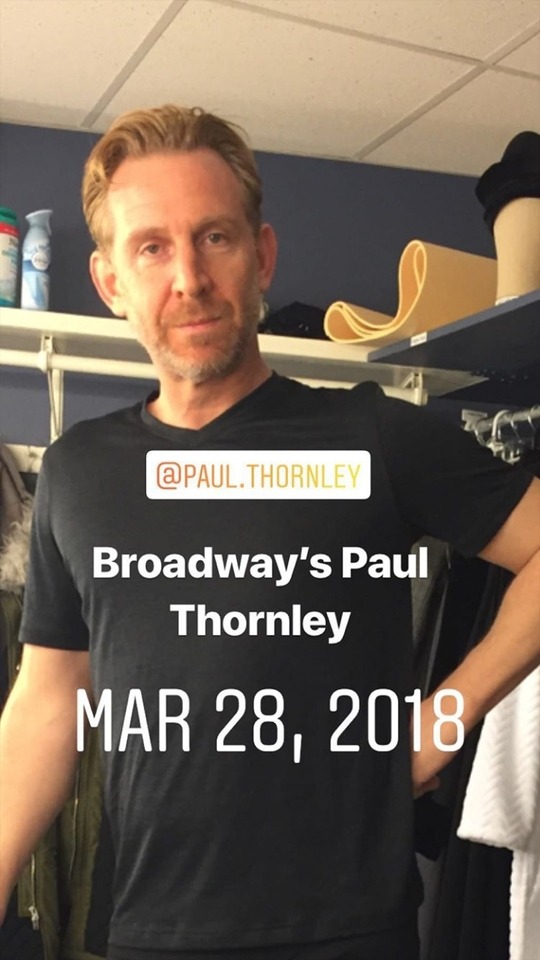
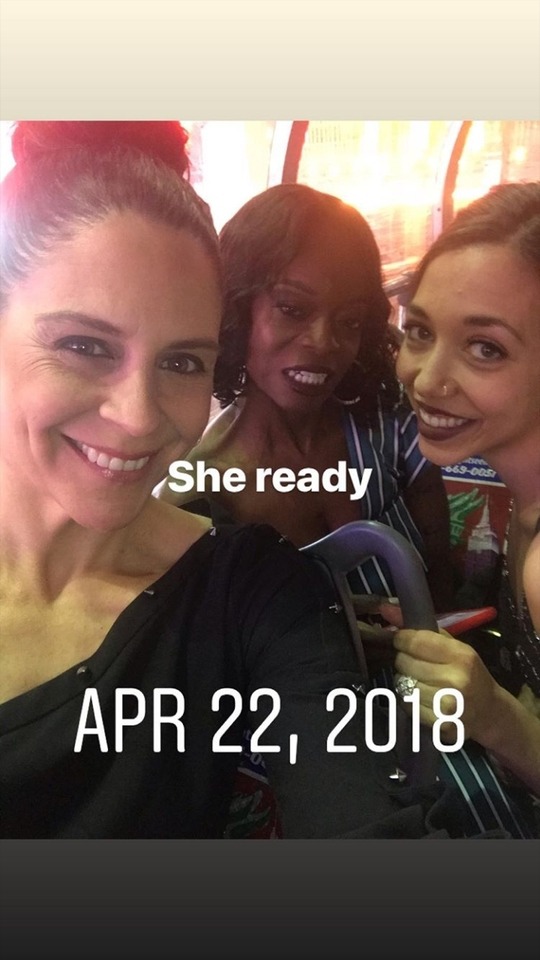
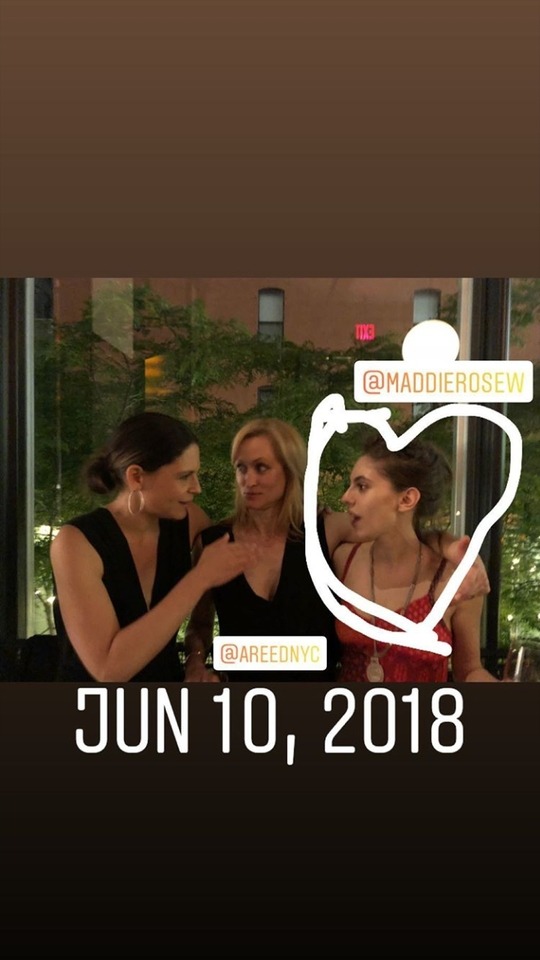
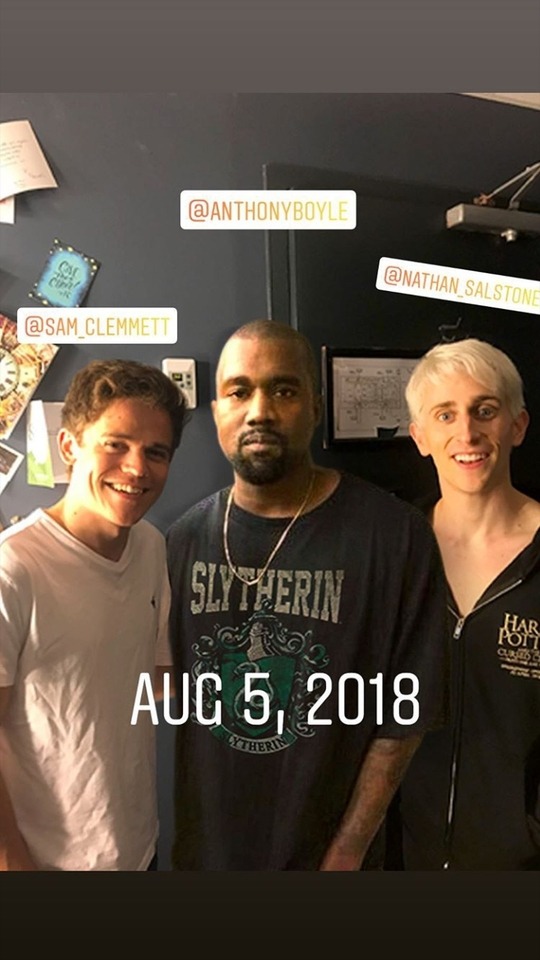
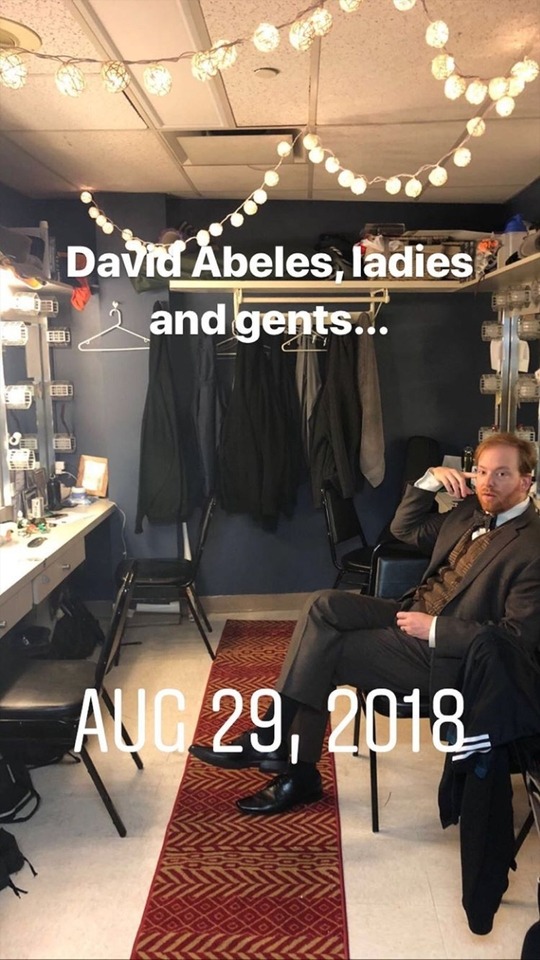
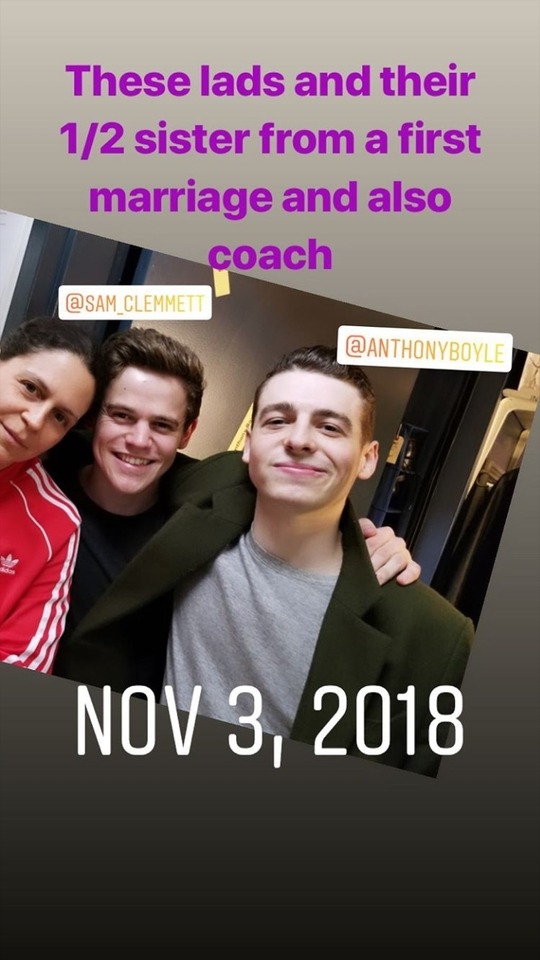

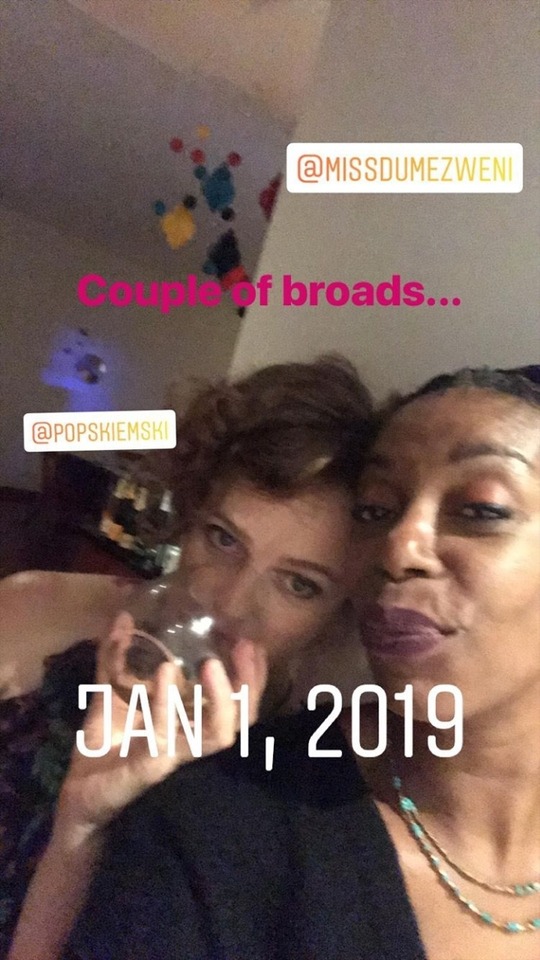
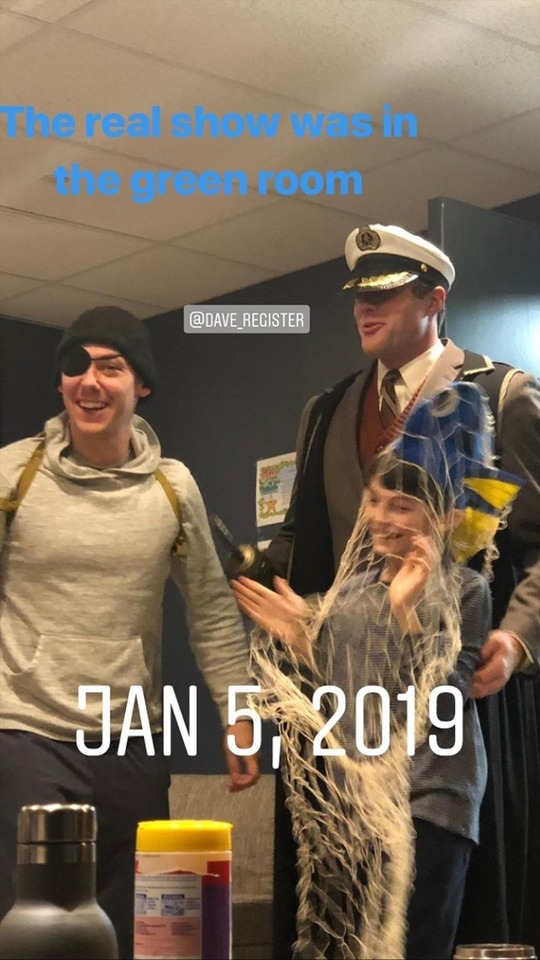
These memories of Katie are amazing!
19 notes
·
View notes
Text
Requests Are OPEN
(I’m happy to do crossovers for anyone who like one)
I’ll do more than just romance ideas as well, if you want a father/daughter or best friends, siblings etc. that’s completely okay.
This is also the same masterlist for if anyone wants any Match-ups, gifs, icons basically just anything you want.
If it's in italics then it's because those are my favourite or the ones I just find easiest to write.
One-shots: Whatever relationship you like, characters included and either writing prompt or small idea of what you want to happen
Match-ups: Fandom (as many as you like), gender/pronouns and sexuality, basic description of physical features and some hobbies/interests, style, any extra info if you like
MINORS
⭐ - Headcanon
❤ - Romance
💋 - Smut
💛 - Fluff
🌹 - Angst
----------
MASTERLIST
----------
Requests are open for the following fandoms:
The Alienist
Cyrus
John Moore
Laszlo Kreisler
Lucius Issacson
Marcus Issacson
Sara Howard
Stevie
The Breakfast Club
Allison Reynolds (the basketcase)
Andrew Clark (the jock)
Brian Johnson (the nerd)
Claire Standish (the princess)
John Bender (the criminal)
Buffy The Vampire Slayer
Angel
Buffy Summers
Rupert Giles
Oz
Spike
Willow Rosenberg
Xander Harris
Criminal Minds
Aaron Hotchner
Alex Blake
David Rossi
Derek Morgan
Elle Greenway
Emily Prentiss
Jennifer Jareau
Kate Callahan
Penelope Garcia
Spencer Reid
DC - (I'm not the biggest fan so the character list for this is short)
(any characters from)
Aquaman
Wonder Woman - I haven't watched 1984, sorry
Divergent
Caleb Prior
Christina
Eric
Peter
Tobias Eaton
Tori
Tris Prior
Will
Doctor Who
10th Doctor
11th Doctor
Amy Pond
Glee
Artie Abrams
Blaine Anderson
Britney Pierce
Finn Hudson
Jake Puckerman
Kurt Hummel
Kitty Wilde
Marley Rose
Mike Chang
Noah Puckerman
Quinn Fabray
Rachel Berry
Santana Lopez
Sam Evans
Tina Cohen-Chang
The Greatest Showman
Anne Wheeler
Charity Barnum
Charles Stratton
Jenny Lind
Lettie Lutz
Phillip Carlyle
P.T Barnum
W.D Wheeler
Grey’s Anatomy (up to the end of season 9)
Addison Montgomery
Alex Karev
Amelia Shepard
April Kepner
Arizona Robbins
Callie Torres
Christina Yang
Denny
Derek Shepard (McDreamy)
Finn Dandridge (McVet)
George O’Malley
Izzie Stevens
Jo Wilson
Lexie Grey
Mark Sloan (McSteamy)
Meredith Grey
Miranda Bailey
Owen Hunt (McSoldier)
Richard Webber
Teddy Altman
Harry Potter
Angelina Johnston
Blaise Zabini
Dean Thomas
Draco Malfoy
Fred Weasley
George Weasley
Ginny Weasley
Harry Potter
Hermione Granger
Katie Bell
Luna Lovegood
Neville Longbottom
Pansy Parkinson
Ron Weasley
Seamus Finnigan
(Young) Tom Riddle
Bellatrix Lestrange
Hagrid
James Potter
Lily Evans
Narcissa Malfoy
Newt Scammander
Nymphadora Tonks
Peter Pettigrew
Remus Lupin
Severus Snape
Sirius Black
The Hunger Games
Beetee
Cato
Cinna
Clove
Effie Trinket
Finnick Odair
Gale Hawthrone
Glimmer
Haymitch Abernethy
Joannah Mason
Katniss Everdeen
Marvel
Peeta Mellark
Primrose Everdeen
Rue
Inkheart
Dustfinger
Farid
Meggie
Mortimer
Knives Out
Benoit Blanc
Marta Cabrera
Ransom Drysdale
Kong: Skull Island
Cole
Houstan Brooks
Jack Chapman
James Conrad
Mason Weaver
Mills
San
Slivko
Lab Rats
Adam Davenport
Bree Davenport
Chase Davenport
Donald Davenport
Douglas Davenport
Leo Dooley
Marcus Davenport
Tasha Davenport
Mamma Mia
Sky
Donna Sheridan
Rosie
Tanya
Sam Carmichael
Bill Anderson
Harry Bright
Sophie Sheridan
Marvel Cinematic Universe (I haven’t watched WandaVision but it’s on my list, I just don’t want to ball my eyes out)
Baron Helmet Zemo
Bruce Banner
Bucky Barnes
Clint Barton
Darcy Lewis
Drax
Gamora
Groot
Jane Foster
Loki Laufeyson
Natasha Romanoff
Nebula
Peggy Carter
Peter Parker
Peter Quill
Rocket
Sam Wilson
Sharon Carter
Shuri
Stephen Strange
Steve Rogers
T’Challa
Thor Odinson
Tony Stark
Vision
Wanda Maximoff
The Mighty Ducks
Adam Banks
Charlie Conway
Connie Monreau
Dean Portman
Dwayne Robertson
Fulton Reed
Gordan Bombay
Greg Goldberg
Guy Germaine
Jesse Hall
Julie Gaffney
Lester Averman
Luiz Mendoza
Russ Tyler
Ted Orion
Terry Hall
NCIS
Eleanor Bishop
Kate Todd
Leroy Jethro Gibbs
Nick Torres
Timothee McGee
Tony Dinozzo
Ziva David
Now You See Me
Daniel Atlas
Dylan Rhodes
Henley Reeves
Jack Wilder
Lula May
Merritt McKinney
One Tree Hill
Brooke Davis
Haley James-Scott
Lukas Scott
Mouth McFadden
Nathan Scott
Peyton Sawyer
The Originals
Aiden
Davina Claire
Elijah Mikaelson
Freya Mikaelson
Hayley Marshall
Joshua (Josh) Rosza
Klaus Mikaelson
Kol Mikaelson
Rebekah Mikaelson
Pitch Perfect
Barden Bellas
Beca Mitchell
Chloe
Emily Junk
Fat Amy
Flo
Stacie
DSM
Kommissar
Pieter Kramer
Treblemakers
Benji
Bumper Allen
Jessie
Rush
James Hunt
Niki Lauda
Scandal (seasons 1-3)
Abby Whelan
Charlie
David Rosen
Fitz Grant
Harrison Wright
Huck
Jake Ballard
Mellie Grant
Olivia Pope
Quinn Perkins
Stephen Finch
Sherlock (RDJ Movies)
Irene Adler
John Watson
Sherlock Holmes
Sherlock BBC
Greg Lestrade
Irene Adler
Jim Moriarty
John Watson
Mary Watson
Molly Hooper
Mycroft Holmes
Sherlock Holmes
Suits (I'm halfway through S3, just finished thingy oils plotline)
Donna Paulsen
Harvey Spectre
Louis Litt
Mike Ross
Rachel Zane
Supernatural
Castiel
Charlie
Claire Novak
Crowley
Dean Winchester
Gabriel
Rowena
Sam Winchester
Teen Wolf
Adrian Harris
Allison Argent
Bobby Finstock
Chris Argent
Derek Hale
Hayden
Issac Lahey
Jackson Whittemore
Jordan Parrish
Kira Yukimara
Liam Dunbar
Lydia Martin
Malia Tate/Hale
Noah Stilinski
Peter Hale
Scott McCall
Stiles Stilinski
Theo Raeken
Twilight
Alec
Alice Cullen
Bella Swan/Cullen
Carlisle Cullen
Demitri
Edward Cullen
Embry McCall
Emmet Cullen
Esme Cullen
Felix
Jane
Jasper Hale
Leah Clearwater
Paul Lahote
Quill
Rosalie Hale
Sam
Seth Clearwater
The Vampire Diaries
Alaric Saltzman
Bonnie Bennet
Caroline Forbes
Elena Gilbert
Enzo St. John
Damon Salvatore
Jenna Sommers
Jo Laughlin
Kai Parker
Matt Donovan
Stefan Salvatore
Tyler Lockwood
Lexi Branson
Liv Parker
Valerie
Vicki Donovan
X-Men
Charles Xavier
Erik
Kurt Wagner
Logan
Raven
Youngblood
Dean Youngblood
Derek Sutton
Jessie Chadwick
Coach Murray Chadwick
#fandom_lover20#The Alienist#The Breakfast Club#Buffy the Vampire Slayer#Criminal Minds#Divergent#Doctor Who#Glee#The Greatest Showman#Grey's Anatomy#Harry Potter#The Hunger Games#Inkheart#Kong: Skull Island#Knives Out#Kong Skull Island#Lab Rats#Mamma Mia#MCU#Marvel Cinematic Universe#The Mighty Ducks#NCIS#Now You See Me#One Tree Hill#The Originals#Pitch Perfect#Scandal#Rush#Sherlock#Sherlock RDJ
300 notes
·
View notes
Text
Music Suggestions for Studying
Movie Soundtracks - I personally love listening to soundtracks when I’m studying - Here are some of my favourites but there are so many other soundtracks I love (I’ll do another post of recommendations if you guys want later!)
Studio Ghibli (a million chef’s kisses)
Schindler’s List
“Rue’s Farewell” & “Horn of Plenty” from the Hunger Games
“For the Love of a Princess” from Braveheart
“Comptine d’un autre ete” from Amelie
“A Kaleidoscope of Mathematics” from A Beautiful Mind
Belle et Sebastien
Blue Planet II
Narnia
Dragonheart
How to train your dragon
Harry Potter & Fantastic Beasts
“Love theme” from the Godfather
“Homestead” from the Good Dinosaur
The Theory of Everything
The Imitation Game
Classical Music
Claude Debussy (Reverie, Clair de Lune)
Frederic Chopin (my all time favourite composer, listen to all his nocturnes - they’re the definition of perfection)
Edvard Grieg (Piano Concerto in A minor Op.16 I. Allegro Molto Moderato is my personal favourite)
Liebeslied by Fritz Kreisler
Pyotr Illych Tchaikovsky (The Nutcracker, Swan Lake, Valse Sentimentale)
Sergei Rachmaninoff (10 Preludes op.23 No.5 in G minor)
War/Epic Music - That’s definitely not what this genre of music is called but I had no idea what else to call it. I love listening to this type of music when writing essays because the music really motivates me to write!
Two Steps from Hell (Invincible Album, especially “Heart of Courage”, Archangel album)
Really Slow Motion (Of Mist and Magic Album)
AudioMachine ( “Try Again Tomorrow”)
Calming Piano Music
Yiruma
Ludovico Einaudi
Peder.B Helland
Brian Crain
Smyang Piano (piano covers - i love his kpop covers!)
That’s all for now - let me know down in the comments if there’s any other genres of music you love listening to when studying - I’d love to listen to them!
Love you all xx
~QuinnStudies
#study music#soundtracks#classical#classical music#chopin#studio ghibli#schindlers list#hunger games#narnia#blue planet#dragonheart#belle et sebastien#how to train your dragon#the imitation game#the theory of everything#the godfather#frederic chopin#debussy#rachmaninoff#kreisler#grieg#tchaikovsky#two steps from hell#war music#epic music#really slow motion#audiomachine#calming piano#yiruma#ludovico einaudi
85 notes
·
View notes
Note
Periwinkle, Argentinean blue, Spanish blue, duck blue, Polynesian blue and I hope you have a beautiful day! 🌻
Hey @tamaraheartz ! Right back at ya'! 🖤
Periwinkle - what’s the best thing that’s happened to you this week?
I think yesterday was the best thing that happened to me this week. It was Tchaik's birthday so I hyperfixated on his music, played Roblox with my bestie for two hours and was surprisingly reminded that I have immaculate intuition yet again (I had a feeling Seb did a gay role in his early days and guess wHaT? He DID).
Argentinian blue - if you could switch closets with any celebrity or fictional character, who would it be and what would you wear?
Oh, good question! I think I would like to switch closets with Harry Styles and try on his purple suit for a change.
Spanish blue - what’s your pick-me-up song?
It's either Liebesleid/Liebesfreud by Kreisler or Humouresque by Dvořák and if you go to the pop side, I think it's either Heartbreak Weather by Niall Horan or hope is a dangerous thing for a woman like me to have-but I have it by Lana Del Rey.
Duck blue - what have you created that you’re the most proud of?
My poetry. I POSSIBLY couldn't be prouder. My babies!
Polynesian blue - what’s the best gift you’ve ever recieved?
I have received Crime And Punishment as a birthday gift and I am GRATEFUL AF.
Thanks for the ask, Tammy.
2 notes
·
View notes
Text
Moonlit Coven Event; Original Character: Media
━━━•✦.✧. Author’s Note.✧.✦•━
Here are excerpts of the playlist I made. Also, added moodboard headers!
You are free to checkout the full playlists linked up in the pinned post under “Find Playlists Here”.
Post under the cut!
━━━━━━•✦.✧.☾.✧.✦•━━━━
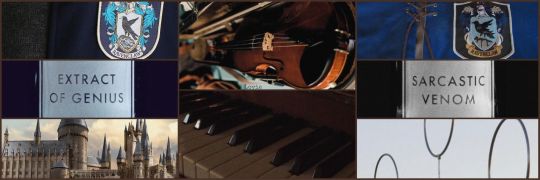
Ravenclaw Head Girl; Victoria Mei Howard
“Dancing Queen” by ABBA
“Girls Just Want to Have Fun” by Cyndi Lauper
“How to Be a Hearkbreaker” by MARINA
“Girls / Girls / Boys” by Panic! At The Disco
“Wonder” by Shawn Mendes
“La vie en rose” by Édith Piaf
“Introduction and Rondo Capriccioso” by Charles-Camille Saint-Saëns
“Liebeslied” by Friedrich-Max "Fritz" Kreisler
“Song of a Secret Garden” by Rolf Undsæt Løvland
━━━━━━•✦.✧.☾.✧.✦•━━━━

Auror: Victoria Howard
“Killer” by The Ready Set
“God is a woman by” Ariana Grande
“you should see me in a crown” by Billie Eilish
“vicious (feat. Lil Mosey)” by Tate McRae, Lili Mosey
“The Phoenix” by Fall Out Boy
“Do I Wanna Know?” by Arctic Monkeys
“Teeth” by 5 Seconds of Summer
“Feeling Good” by Michael Bublé
“505″ by Arctic Monkeys
“Oh, Pretty Women” by Roy Orbison
━━━━━━•✦.✧.☾.✧.✦•━━━━
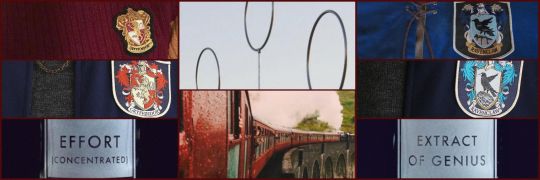
Hogwarts: Howard-Scamander
“Yellow” by Coldplay
“Somewhere Only We Know” by Keane
“Would You Be So Kind” by dodie
“Shut Up & Kiss Me” by Orianthi
“Line Without a Hook” by Ricky Montgomery
“It’s Been A Long, Long Time” by Harry James and His Orchestra, Vocals by Kitty Kallen
“Good-Old Fashioned Lover Boy” by Queen
“Dirty Little Secret” by All American Rejects
“Candy” by Robbie Williams
━━━━━━•✦.✧.☾.✧.✦•━━━━
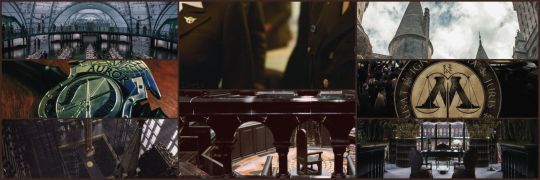
Auror Duo: Howard-Scamander
“Believer” by Imagine Dragons
“Don’t Threaten Me with a Good Time” by Panic! At the Disco
“sex money feelings die” by Lykke Li
“Sway” by Michael Bublé
“Bang!” by AJR
“That’s What I Like” by Bruno Mars
“Come Along” by Cosmo Sheldrake
“Animals” by Maroon 5
“Counting Stars” by OneRepublic
━━━━━━•✦.✧.☾.✧.✦•━━━━
1 note
·
View note
Text
The Hollywood Anti-Nazi League Presents “Talent in Exile” (WFKB, 1938)
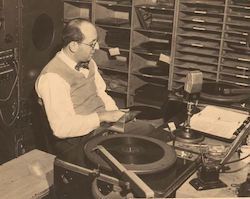
Alfred Leonard in the studio at KFAC in the 1930s
Courtesy of Eleanor Rubin
One of the nice things about publishing a book (since you ask: Hollywood and Hitler, 1933-1939, out this year from Columbia University Press) is that you often get messages over the transom from people who have a personal investment in the subject—and sometimes a personal story and memento to share. In the book, I made a passing reference to a radio personality named Alfred Leonard, a member of the Hollywood Anti-Nazi League for the Defense of Democracy. Founded in 1936 and numbering some 5,000 artists-activists from all ranks of the entertainment industry, the Hollywood Anti-Nazi League (HANL) worked tirelessly to raise awareness about the looming menace of Nazism--holding rallies, broadcasting radio shows, and doing its best to inject anti-Nazi sentiments into Hollywood cinema (no easy task given the obstacles set up by the Production Code Administration, the in-house censors who always sought to denude American cinema of overt political content). Leonard was one of the stalwart foot soldiers in HANL’s ranks.
Recently I got a nice email from Alfred Leonard’s daughter, Eleanor (Leonard) Rubin, of Newton, MA, a graduate of Brandeis University (I’ve been at Brandeis long enough to know that in any game of Jewish geography no one is more than two degrees of separation removed from Brandeis). Elly politely informed me that Mr. Leonard was much more than a radio personality; he was also a prominent music critic, symphony promoter, and music shop owner. In 1933, he fled Hitler’s Germany and made his way to Hollywood. Three years later, his brother Joseph Leonard, a noted pianist and composer who also happened to be blind, followed.
Elly then made a tantalizing offer: she had in her possession a copy of a radio broadcast Joseph Leonard had made for a show called Talent in Exile, produced by HANL and broadcast over the facilities of KFWB, the in-house radio station of Warner Bros. Pictures. Would I like to have a copy?
Silly question. While researching Hollywood and Hitler, I had looked in vain for episodes of Talent in Exile, a weekly series of anti-Nazi agit-prop showcasing refugee talent. Even more than 1950s television, 1930s radio is maddeningly difficult to track down. Before the widespread use of magnetic tape in the 1940s, radio shows were broadcast live over the airwaves and seldom preserved on a transcription discs (a phonograph record similar to though slightly smaller than a 33 1/3 LP) . Elly’s family lore on the provenance of the recording was a little hazy: her copy came from a reel-to-reel tape recorder. I assume a technician at KFWB recorded the show on a transcription disc as a keepsake for the artist; years later, someone in the family must have transferred the disc to magnetic tape.
Radio was an important weapon in HANL’s propaganda arsenal: the group understood that the living room medium of the day provided a loud megaphone for anti-Nazi rhetoric. On November 16, 1936, HANL established a committee to devise ways to permeate the radio airwaves and raise the alarm about Nazi Germany. Alfred Leonard, who then hosted a music-themed interview show for KFAC in Los Angeles, was the natural choice to chair the committee, which also included producer Lester Cowan, set designer Harry J. Zutto, and songwriter Jay Gorney. “Hitler and his head propagandist Goebbels . . . are adepts at the use of radio in their efforts to fool all the people all the time,” HANL reasoned. “We will try to beat them at their own game. We will try to prove that facts can be just as colorful as fraud and fiction over the air.” [1]
Talent in Exile played a prominent role in HANL’s over-the-air outreach. The idea was to showcase refugee talent and condemn the regime that hounded them from their homeland. “Germany’s loss was the world’s gain,” declared HANL in announcing the series. “Hitler’s organized suppression of all cultural values has achieved its objective. Today, none of the famous men and women who helped to establish Germany’s reputation as one of the leading nations in the world can or will set foot on German soil.” The exiled talent—and their American-born kinsmen-- would decry Nazi intolerance, give thanks to America for offering shelter to the persecuted, and celebrate freedom of expression in the beacon of democracy. Anti-Nazi consciousness-raising animated almost every aspect of the show’s entertainment line-up--musical performances, comedy skits, and dramatic reenactments. The hands-on producer for the program was stage, screen, and radio actor Elliot Sullivan. (Like many of the core activists for HANL in the 1930s, Sullivan would be called before the House Committee on Un-American Activities during the Cold War. In 1956 he was cited for contempt for standing on his Fifth and First Amendment rights. In 1961, a federal district court acquitted him of all charges.)
Talent in Exile could certainly draw on a deep well of exiled talent: the influx of artists run out of Nazi Germany had already earned Hollywood the sobriquet “Weimar on the Pacific.” “Many of [the talented exiles] have come to this country, have settled in Los Angeles,” HANL noted. “Talent in Exile will bring them before the microphones as material witnesses for Hitler’s crimes against culture and civilization, as warning examples for all who play with the idea of curtailing free thinking, independent scientific research, and unhampered artistic expression.”[2] A typical thirty-minute episode might be built around a discussion with German composer Ernest Toch; a profile of novelist Thomas Mann; or a dramatization of Savage Symphony: A Personal Record of the Third Reich, a memoir by Eva Lips.[3] However, not all the featured talent was in exile. For one jam-packed show, the screenwriter and wit-about-town Dorothy Parker read an anti-Nazi sketch, soprano Sylvia Bagley sang two songs banned by the Nazis, and League members read a dramatization of the life of the imprisoned Lutheran pastor, the Rev. Martin Niemöller.[4] Another intriguing episode featured a comedy skit by RKO screenwriter Violet Brothers Shore imagining a meeting between Hitler and Mother Goose, followed by a more serious entry set in a Nazi concentration camp for women, featuring the Academy Award-winning actress-activist Gale Sondergaard in the lead role.[5]
Fortuitously, the Talent in Exile show that Elly shared with me is the premiere episode, broadcast on Thursday at 9:00 p.m. on February 17, 1938. The guest artist, her uncle, Joseph Leonard, certainly fit the bill. “After Hitler’s rise to power, Joseph Leonard endured for three years the hardships of living in Germany, the loss of his teaching position, the limitation to play only before the `Jewish Culture Organization,’” reported an article in Hollywood Now, HANL’s the newspaper of record. “But when at last he was subjected to that final curtailment of cultural activities which prohibited his playing of music by `Aryan’ composers, when he could no longer perform the works of Bach, Beethoven, and Mozart, he left Germany and accepted the invitation of a Southern California music conservatory [the Pacific Institute of Music and Fine Arts].”[6]
Given the rarity and uniqueness of the archival find, a play by play account might be warranted. Donald Ogden Stewart, the A-list screenwriter who served as HANL’s chairman, introduces the proceedings. “It is my great pleasure as chairman of the Hollywood Anti-Nazi League to offer to radio listeners a remarkable new undertaking of the League, a program called Talent in Exile, which will be a weekly feature over this station. It will present men of talent who have been driven by fascism from their own countries to find refuge here. Sometimes, as this evening, you will hear their names and sometimes”—here Stewart’s voice takes on an ominous tone—“their names cannot be known.”
Stewart then turns the show over to the Canadian-born composer and lecturer Gerald Strang, director the New Music Society of California and an assistant to Arnold Schoenberg at UCLA. Schoenberg himself, perhaps the most famous of all musical refugees, had fled the Nazis in 1933. Strang provides the deep background on the show’s design and animating principles::
When Hitler came to power, almost every cultural leader who helped to make Germany’s name respected the world over has either left that country in protest or has been driven into exile. They are men like Albert Einstein, Nobel prize winner for his theory of relativity; like Thomas Mann, one of the truly great authors of this century; like the dermatologist Wilhelm Frei, the bacteriologist Carl Lange; the biologist Richard Goldschmidt, who now teach at our universities. Men like Max Reinhardt, the famous theatrical producer, and Otto Klemperer, formerly director of the Berlin State Opera and now conductor of our Los Angeles Philharmonic Orchestra. Men like Arnold Schoenberg and Ernest Toch, recognized leaders among the composers of our time. Artists of the rank of [violinist and composer] Fritz Kreisler and [pianist and composer] Artur Schnabel, men who are today in exile from Nazi Germany, together with the music of Mendelsohn and the poetry of Heine.
Strang makes clear that the guest for the evening has earned his invitation:
From the ranks of these famous exiles comes the artist whom it is my great privilege to introduce, the distinguished young pianist and composer Joseph Leonard. His notable record as a concert pianist, composer, and pedagogue was officially recognized by the United States when he was admitted to this country in spite of his blindness. Thus the energy and high ideals which have guided him on his way to musical fame have helped him in surmounting the last obstacle in his path toward a new life—a life in exile but in a country where freedom and democracy are still considered cornerstones of human society.
Strang’s reference to Leonard being “admitted to this country in spite of his blindness” was a diplomatic way of calling attention to the restrictive immigration policies that, throughout the 1930s, barred so many refugees from Nazism from entry into the United States. He continues:
Joseph Leonard will first play a work by Beethoven who is not only a musical genius but also a true democrat, a champion of human rights. In this age of dictators it is well to remember that Beethoven tore the dedication page to Napoleon from his Eroica Symphony when he heard that Bonaparte had made himself dictator of his people. Joseph Leonard will play Beethoven’s Sonata in G Major, Opus 14, Number 2.
Leonard plays the piece magnificently. Before his next performance, from the pen of Franz Schubert, Strang asks Leonard to say a few words about the reasons for his selection. “Well, Mr. Strang, there are two reasons why I have chosen this piece,” he says in accented but perfectly understandable English. “First of all, I think that Schubert belongs to us, the talent in exile, because most of his famous songs are written on Heine poems and therefore can no longer be performed in Germany.” (Heine’s poetry like so much Jewish art and literature was decreed “entartete Kunst” [degenerate art] by the Nazis. ) “But my second reason is that I feel free again in this free country to play whatever I please under no punishment. And so, I happily present to you Schubert’s Impromtu 90, Number 3, in the original G-flat major. “
After Leonard’s performance of Schubert, Strang comes on the air again to introduce the third musical selection, a composition by Joseph Leonard himself entitled Five Small Pieces for the Piano. Strang notes that “As a composer [Leonard] is in the same boat as [Felix] Mendelssohn, Gustav Maher, Schoenberg, Toch, [Paul] Hindemith, [Bela] Bartók, and Alban Berg, whose works can no longer be played in Germany today.” Strang repeats the wry compensation: “Germany’s loss is our gain.” Leonard then plays his own Five Small Pieces for the Piano.
After the final performance, an unidentified announcer wraps up the show with the station’s call sign and a final reminder: “You have been listening to the first in a new series of programs, Talent in Exile, presented by the Hollywood Anti-Nazi League.”
As a regular weekly program, Talent in Exile only aired for a few months in 1938. It was an unsponsored “sustaining program” that took enormous time and effort, all volunteer, to mount—hence too why its scheduling bounced around on the dial, from Thursday at 9:00 p.m., to Friday at 6:30 p.m., or at 7:00 p.m., or at 8:30 p.m. Hollywood Now was often reduced to advising readers “to telephone the League office at Hillside 7391 to find out the exact time” of the broadcast.[7] As far as I can determine, the last regularly scheduled broadcast occurred on May 27, 1938. However, HANL kept up its campaign over the airwaves—due to the generosity and staunch support of Jack and Harry Warner--with anti-Nazi news and entertainment shows throughout the 1930s. Also, the Talent in Exile brand was used other forums, such as a massive “Talent in Exile” benefit held on December 3, 1938, at Philharmonic Auditorium, an event held to raise money for the victims of the Nazi pogrom of November 9-10, 1938, now known to history as Kristallnacht.
Thanks to Eleanor Rubin, one fascinating episode of Talent in Exile has surfaced. Perhaps, somewhere out there, another descendent of an exiled talent might have a copy stashed away in the attic?
by Thomas Doherty
Endnote
[1]“Big Names Set for Broadcasts,” Anti-Nazi News, February 20, 1937: 1, 4.
[2] “Joseph Leonard Opens League Radio Series,” Hollywood Now, February 2, 1938: 1, 3.
[3] “Savage Symphony Set on Exile Program,” Daily Variety, April 28, 1938: 4.
[4] “Dorothy Parker Reads,” Daily Variety, February 22, 1938: 6.
[5] “Hitler, Mother Goose On KFWB Bill--,” Daily Variety, April 13, 1938: 6; “Air Dr. Mann Career,” Daily Variety, May 5, 1938: 7..
[6] “Joseph Leonard Opens League Radio Series,” Hollywood Now, February 2, 1938: 1, 3.
[7] “Helen Gahagan, Milt Gross On Air Show,” Hollywood Now, March 26, 1938: 1.
1 note
·
View note
Photo
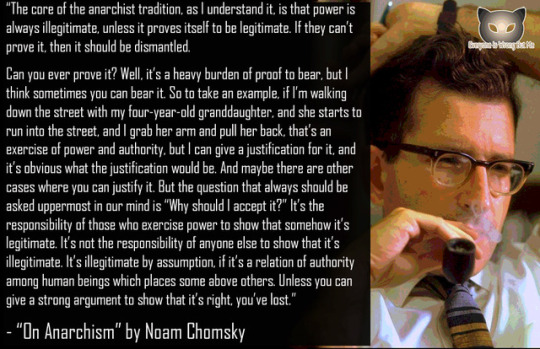
Editor’s note: please forgive my recent absence from this blog; I’ve been laid up with a winter cold, the coughing from which messed up my old lady trick back. In between feeling like crap and complaining about being awake or moving, I managed to bang out just under 12K words about corporate media attempts to associate Bernie Sanders with violence against women. You can fine Part One here, and Part Two here.
Today I thought I’d ease back into the flow of things by posting something breezy, personal and extremely straightforward; primarily because my brain is essentially a twitching Slurpee after spending two straight weeks studying corporate media ratf*cking in US politics exclusively. “Be careful when hunting monsters...” yada, yada.
Today’s quotation is short, sweet and totally self explanatory - it comes from one of those Noam Chomsky compilations that combines a few chapters of text from previously published material with some transcribed interviews with or letters written by Chomsky. In this particular case, the book in question is “Chomsky: On Anarchism” and the passage comes from a March 22, 2002 interview with Harry Kreisler.
While as a general rule, most pinkos I know will have at least a passing grasp of both socialist theory and some aspects of the historical record of left wing movements and ideology in the west; frankly however, very few of my influences and peers are equally specialized in both. Indeed, I find that most left wing scholars or essayists are either heavy consumers of left wing political and social theory, or heavy consumers of left wing historical writing; while trending towards merely “doing the required reading” for their non-preferred focus.
I mention this primarily as a way of explaining what I really like about Noam Chomsky’s work as a whole - the fact that he seamlessly blends theoretical discussions with historical examples presented from an accurate (and typically, very left wing) perspective. This fusion of the two major streams of left wing scholarship would make Chomsky an important writer on the left even if he wasn’t also considered one of America’s leading intellectuals. Chomsky truly is a national treasure and every time he even so much as sneezes in public, I find myself worrying about what we’re going to do when he is finally gone.
With that having been noted however, I have long since moved beyond my adolescent hero-worship of Noam and insistence that he represents some sort of barometer for all left wing views. Indeed, after years of reading his work and following his statements in public appearances, where I think Chomsky fails as a writer is in a role that he himself will tell you he’s never asked for, that of “moral compass” and “arbiter of truth” in left wing literature, media studies and academic discourse.
The lesson as always is that you can learn a lot from those who have come before you, but nobody is infallible - it’s better for the clear-eyed, honest pinko scholar to have influences, rather than heroes.
- nina
3 notes
·
View notes
Text
SI-OC Fanfic Recs
So, it’s been a long time coming, but I finally got the time and energy to do this. What better way to start, but with one of my favorite guilty pleasures.
I listed them in the order that I read them.
This is a post in progress, though, so I’ll update it when I have a new one.
Naruto
Déjà vu no Jutsu by Vixen Tail. AO3 // FF.net
Take one dead, thirty year old career soldier, stick in the body of a child during the Second Great Shinobi War. Add a mini-Namikaze Minato, ninjas, chakra, tailed beasts, and shake well. Is it any wonder she thought she was insane?
It’s so good. I love everything about this fanfic. The characters, the world-building, the way emotions and trauma are treated. There are just no words strong enough to explain how much I love this one. I particularly enjoy the fact that the main character doesn’t accept reincarnation as perfectly normal and thinks she’s losing her mind. Also, there is an explanation about what exactly happened for her to be here and that’s awesome.
Clearing Mist by shadownumera. FF.net
I have the worst luck ever. First off, I die. Then I get reborn into the Naruto universe. Yay right? WRONG. Nobody ever said you get to be reborn into Konoha. Which makes finding out where I am in the story line that much harder. I don't know if I can change anything, or if the bloodbath is far behind me. One thing's official though. I'm screwed.
This one is more lighthearted, but still pretty amazing. It also diverges from most SI fanfic by the fact that the main character is reborn in Kiri.
108 Earthly Temptations by Vixen Tail. AO3 // FF.net
A character study into why the older generations of shinobi are harsher and less inclined to compromise. SI/OC Pre-Konoha, Warring States Period, Post-Founding. Currently up to the middle-end of the Second Great Shinobi World War.
I found this one slightly confusing at times, particularly in the beginning. Still a really good read.
The Yondaime's Assistant by DianaMoth. FF.net
When I reincarnated in the world of Naruto, I was lucky enough to live in Konoha but not lucky enough to get all the superpowers you could hope for. I failed my jounin-sensei test and ended up in the Genin Corps. Bye bye jounin rank but, considering it also meant avoiding the battlefield, that's fine with me. Now I just had to get a position allowing me to change History...
I love this one! It’s different from others because we mostly met the main character when she’s already an adult. There’s not long chapters dedicated to how much it sucks to be dead or to be stuck in a baby’s body. It’s refreshing. Also, the author didn’t shy away from Polyamory and it makes me really, really happy.
Guardian Angel of Trouble Twins by DianaMoth. FF.net
Reincarnating as a crow was nicer than you would think... until the Trouble Twins found the summoning scroll for the Karasu. Then they grew on her and she had to save their lives. How annoying. They better gave her lots of almonds or she'll elope with the ninken summoner!
It’s crack, honestly, and I can’t have enough! This one takes a completely different turn from regular SI fanfic and it’s so, so good.
Stamping on Butterflies by kjate95. FF.net
I had a feeling in the back of my mind as if something had changed that day. Had I looked around I would have noticed a shadow lurking in the trees and something change in said persons eyes with interest. I might have regretted revealing so much. But I didn't notice, and so I remained blissfully ignorant.
This one is about the Hyuuga and they are so mess up.
What Doesn't Kill You by Zbluez. FF.net
...Oh wait, it did.
That’s actually a perfect summary for this one and I love it. Also, more moral ambiguity and some sciency aspects that went over my head.
Dragonfly by peccolia. FF.net
Being reborn into the Uchiha clan in the same generation as Itachi promises nothing but a short-lived second life. But, hey—if I'm going to die with certainty, I might as well go out with a bang, right?
It’s not a happy ending and it makes me really sad, but at the same time I wouldn’t have it any other way. Before it goes to that though, it’s completely crackish.
True to Myself by flitterflutterfly. AO3 // FF.net
I never expected to die young, but if I had I would have probably thought something normal like a car accident. I wasn’t given a peaceful death though. Maybe the trauma I went through on that night, the same night as the Uchiha massacre, is the reason I found myself in the Naruto world. I was far from happy about any of it, but I’d always been a determined person and I learned to make the best of the situation.
This one is unfortunately abandoned, but it’s still awesome. I still recommend it, because it's a really good work with a character who didn’t have a peaceful death, some reflexion about identity, how the character deals with trauma...
Someday We'll Leave the Light On by petrichor. AO3
It is not a question of whether or not we pass the genin exam; it is a question of, Who will be on the team?
This one is almost a character study in some aspects. The author is playing with the writing style and it makes for a really flowing reading. Once you start, you just never want to stop, almost like you’re in a hurry and running with the characters.
Hear the Silence by EmptySurface. FF.net
"When did you start to remember?" He asked next, relaxing further in his seat, which Kyo found calming. In which another lease on life is a bit more complicated than Kyo had at first anticipated.
This one is really interesting. The world-building alone is wonderful. All the characters are well fleshed-out and it handles very well the reality of child soldiers, trauma and all those other nasty things that aren’t elaborated in Naruto, but we all know are there.
Katekyō Hitman Reborn!
Russian Roulette by Vixen Tail. AO3 // FF.net
No one ever said an SI gets a place in canon events, or that they would be ideally placed at all. How much would you recall if you had decades to go before anything in a long forgotten story comes to be?
At this point, you can just assume that Vixen Tail is awesome and all her works are worth a read.
Seiryū by petrichor. AO3
Reincarnation is not always a blessing. A butterfly beats its wings, and a hurricane forms halfway around the world. (Or, What would happen if Sawada Tsunayoshi had an older sibling figure to look up to and be tutored by years before a certain Sun Arcobaleno showed up in Namimori?)
The second half of the story is almost entirely in Reborn’s point of view (for now) and it’s a really amazing perspective.
Bolt from the Blue by Umei no Mai FF.net
Xanxus picks up his first Guardian very early; his father rather wishes he hadn't. Things change accordingly.
Umei no Mai is mainly known for her crossover HP-KHR Black Sky, but Bolt from the Blue is definitely my favorite.
Harry Potter
Triumphant, the Dreamer by Shadowblayze. AO3 // FF.net
Heather's not exactly sure how she got here, but if these people thought that they would be able to manipulate her little brother without a her raising hell about it, they were about to be unpleasantly surprised.
There aren’t a lot of SI-OC in the HP fandom. Or at least, I haven’t found a lot of them, but this one is worth everything. And the world-building is truly magical.
Percy Jackson
Eye of the Hurricane by Hanane EL Mokkadem. FF.net
Life as a demigod is short and brutal. Here's to hoping I don't die before I'm at least old enough to get laid.
This one is the first PJO SIOC I read and I still love it.
The Ocean’s Radiance by Madrigal-in-training. FF.net
She had idly daydreamed about being reincarnated into her favorite books before but Hikari Kurosawa, Daughter of Apollo, was never supposed to be a character there, was she?
Madrigal-in-training has really great ideas and I love reading her works. Ocean’s Radiance is one of my favorite. She stays in the PJO’s main universe with the Greek gods, but by making her OC half-Japanese, she also develops her headcanon about Japanese demigods and it’s really interesting. The fic is also humoristic and fluffy while staying serious. Hikari is full of resources and determined to stay alive and it’s just a really good read.
Dreamer by Dante Kreisler. FF.net
Ignoring the rebirth, I had a peaceful life. School, dyslexia, step-family, ADHD, and camp. Even when Percy Jackson entered Camp Half-Blood, nothing particularly exciting came into my life, but of course, I probably jinxed myself.
I loved fic that develops minor characters, or in this case minor gods. Like with Apollo’s gift of prophecies, a child of Hypnos can learn a lot through dreams and it’s wonderful.
37 notes
·
View notes
Note
grey
grey: songs you listen to on a rainy day.• love’s sorrow - fritz kreisler.• from the dining table - harry styles.• fossa - daughter.• moonlight sonata - beethoven. • you know i’m no good - amy winehouse.• i can’t give you anything but love - lady gaga and tony bennett.• liability - lorde.
8 notes
·
View notes
Photo
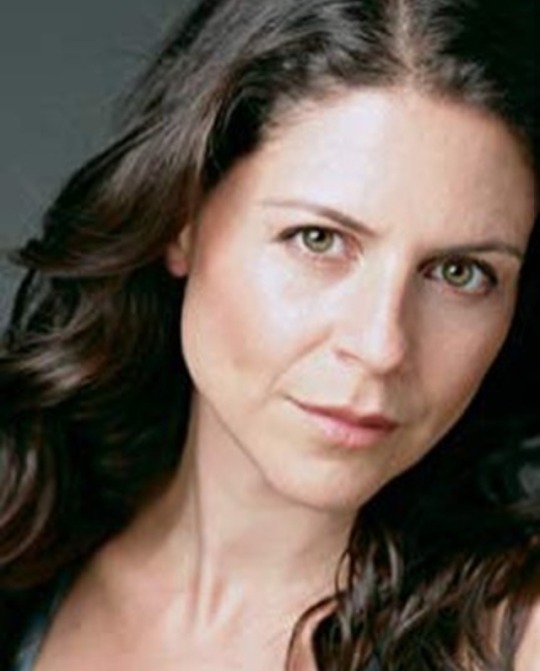
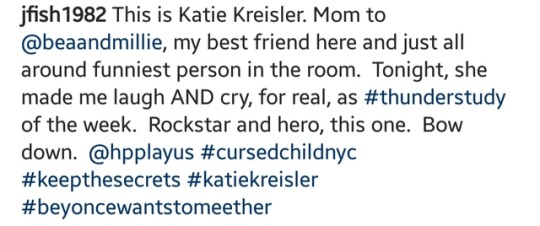
Congrats to Katie on her understudy debut yesterday as McGonagall/Trolley Witch!
8 notes
·
View notes
Text
Okay I got a record player for christmas, and I just wanna show off my record collection so far, at least the good stuff that I’ll listen too. It’ll be under the cut!
12in
======
The Stripper and Other Big Band Hits - Si Zentner
Abbey Road - The Beatles
Mary Poppins - Disneyland Records
Our Secret Weapon - Jose Jimenez
Artie Shaw Swings Show Tunes - Artie Shaw
Wonderfulness - Bill Cosby
Moscow Melodies - The Capella Russian Male Chorus
Elvis' Christmas Album - Elvis Presley
Christmas With Colonel Sanders - Various
Unforgettable Fifties - Various
Lady and the Tramp - Disneyland Records
Shakespeare, Tchaikovsky & Me - Jayne Mansfield
Rubber Soul - The Beatles
Hot Space - Queen
Mandatory Fun - "Weird Al" Yankovic
Sgt. Peppers Lonely Hearts Club Band - The Beatles
Greatest Hits - Queen
The Black Parade - My Chemical Romance
The Transformers: The Movie - Original Motion Picture Soundtrack
Pickmans Model - Read by Andrew Leman
Death of a Bachelor - Panic! At the Disco
The Jungle Book - Disneyland Records
2112 - Rush
The Button-Down Mind Strikes Back - Bob Newhart
The Best of Bob Newhart! - Bob Newhart
Monty Python Live! At City Center - Monthy Python
Les Miserables - Original London Cast Album
Never Gonna Give You Up - Rick Astley
War - U2
SuperTrouper - ABBA
War of the Worlds - Original Broadcast Recording
Elvis as Recorded at Madison Square Garden - Elvis Presley
Boxcar Willie Sings Hanl Williams and Jimmie Rodgers - Boxcar Willie
Gilberd and Sullivan Overtures - Orchestra Conducted by Alan Ward
1984 - Eurythmics
I Feel For You - Chaka Khan
Born to Run - Bruce Springsteen
In Heat - The Romantics
Live in Australia - Elton John
Bambi - Disneyland Records
The Aristocats and Other Cat Songs - Disneyland Records
Alice in Wonderland - Disneyland Records
The Soul of Spain - 101 Strings
Rarities - The Beatles
McCartney - Paul McCartney
Let It Be - The Beatles
Purple Rain - Prince and the Revolution
The River - Bruce Springsteen
Bob Dylan's Greatest Hits - Bob Dylan
Timepieces/The Best of Eric Clapton - Eric Clapton
Kenny Rogers' Greatest Hits - Kenny Rogers
Get Lucky - Loverboy
Diary of A Madman - Ozzy Osbourne
Radio Active - Pat Travers
Parlor Piano - Joe "Fingers" Carr
Ten Years of Gold - Kenny Rogers
Aloha From Hawaii Via Satellite - Elvis Presley
Deja Vu - Crosby, Stills, Nash & Young
Crosby, Stills & Nash - Crosby, Stills & Nash
South Sea Island Magic - Reader's Digest
Hamilton - Original Broadway Cast Recording
Vol. I-III - Pentatonix
7in
======
Let's Kick Shell - Teenage Mutant Ninja Turtles
Super Mario - Koji Kondo
This is the Life - "Wierd Al" Yankovic
Jose Iturbi PLays - Jose Iturbi
Mischa Elman Encores - Mischa Elman
Violin Solos - Fritz Kreisler
Put a Dime in the Jukebox - Tami Harris
"Man Smart" and Other Folk Songs - Harry Belafonte
Body and Soul - The Manhattan Transfer
Share a Song From Your Heart and F-R-I-E-N-D-S - Ronald McDonald and Friends
Pinkish/Don't Try - Gerard Way
3 notes
·
View notes